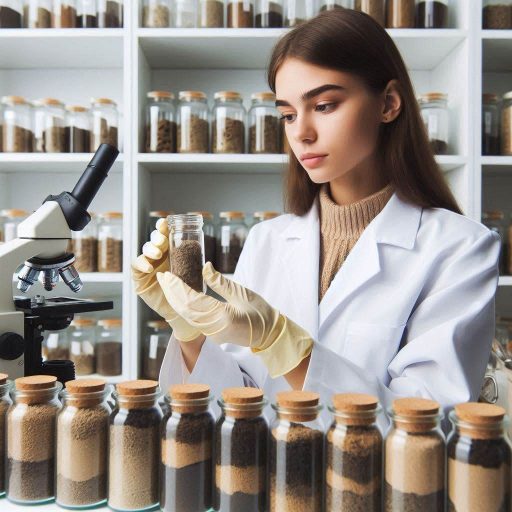Introduction
Soil scientists play a critical role in agriculture and environmental conservation as soil scientist fieldwork laboratory.
They study soil properties, composition, and health to enhance productivity.
Their work significantly impacts food security and ecosystem sustainability.
Fieldwork and laboratory work are two essential settings for soil scientists.
Fieldwork involves collecting soil samples and assessing soil conditions in natural environments.
It allows scientists to observe soil behavior and interactions with plants and microorganisms.
Laboratory work focuses on analyzing soil samples using advanced techniques and equipment.
Scientists conduct experiments to measure soil properties and understand their implications for agriculture and the environment.
Both settings contribute valuable insights to soil science.
This blog post aims to compare fieldwork and laboratory work for soil scientists.
We will explore their unique roles, advantages, and challenges.
By examining both settings, we can appreciate their importance in advancing soil science research.
Understanding the balance between fieldwork and laboratory work can inform aspiring soil scientists about their career paths.
Ultimately, recognizing the strengths of both environments helps improve agricultural practices and promote environmental stewardship.
Role of a Soil Scientist
Role of a Soil Scientist and the Importance of Their Work
Soil scientists play a crucial role in agriculture and environmental science.
They study the characteristics and behaviors of soil to ensure its health and productivity.
Their work impacts food production, land use, and ecological balance.
Soil scientists contribute to sustainable practices that enhance soil quality while preventing degradation.
Understanding soil composition, fertility, and health is vital for achieving these goals.
How Soil Scientists Study Soil Composition, Fertility, and Health
Soil scientists analyze soil composition through various methods.
They collect samples from different locations to assess their properties.
These properties include texture, structure, and moisture content.
They use techniques such as soil mapping and remote sensing to gather data.
This information helps determine soil fertility and its capacity to support plant growth.
In the laboratory, soil scientists conduct tests to evaluate soil health.
They analyze samples for nutrients like nitrogen, phosphorus, and potassium.
They also assess pH levels and organic matter content.
These tests reveal the soil’s ability to retain water and support microbial life.
Healthy soil contributes to higher crop yields and better environmental conditions.
Various Tasks and Responsibilities of Soil Scientists in Both Field and Laboratory Settings
In the field, soil scientists perform essential tasks to study soil in its natural environment.
They conduct field surveys and assess soil profiles.
This hands-on approach allows them to observe how soil interacts with the ecosystem.
They measure factors like erosion, compaction, and moisture retention.
Understanding these interactions is vital for developing effective land management strategies.
Soil scientists also collaborate with farmers and agronomists.
They provide guidance on soil management practices that enhance fertility and sustainability.
By sharing their knowledge, they help farmers make informed decisions about crop rotation, fertilization, and irrigation.
This collaboration promotes practices that benefit both agriculture and the environment.
In addition to fieldwork and laboratory analysis, soil scientists engage in research and innovation.
They investigate new techniques for improving soil health, such as biochar application and cover cropping.
These innovations contribute to sustainable farming practices and help mitigate soil degradation.
By staying updated on the latest research, soil scientists ensure their methods remain effective and relevant.
Overall, the role of a soil scientist is multifaceted and essential.
Their work spans both field and laboratory settings, providing valuable insights into soil health and fertility.
By studying soil composition and implementing sustainable practices, they support agriculture and environmental conservation.
Their expertise helps ensure a productive future for our soils, crops, and ecosystems.
Read: U.S. Cities with the Most Opportunities for Environmental Scientists
Fieldwork for Soil Scientists
Process of Fieldwork for Soil Scientists, Including Soil Sampling and Data Collection
Fieldwork is essential for soil scientists.
It involves collecting soil samples from various locations for analysis.
Soil scientists use hand tools, like soil augers, to extract samples.
They typically take samples at different depths to assess the soil profile.
Each sample must represent a specific area accurately, ensuring reliable data.
After collecting soil samples, scientists label and document each sample’s location.
They note environmental conditions, such as temperature and moisture levels.
This information aids in understanding the context of each sample.
Soil scientists often use GPS technology to record precise coordinates for their samples.
This ensures that they can revisit the same sites in the future.
Data collection continues in the field, where soil scientists assess physical properties.
They evaluate soil texture, structure, and color by conducting visual inspections.
Soil scientists may also conduct in-field tests for pH and moisture content.
These assessments provide immediate insights into soil health.
Importance of Conducting Fieldwork to Assess Soil Properties in Their Natural Environment
Conducting fieldwork is crucial for understanding soil properties.
Laboratory tests cannot replicate the complexity of soil in its natural environment.
Fieldwork allows scientists to observe how soil interacts with water, air, and organisms.
This holistic approach provides a comprehensive understanding of soil behavior.
Field studies also enable soil scientists to identify regional differences in soil characteristics.
Variations in climate, vegetation, and land use impact soil properties.
By studying these differences, soil scientists can make recommendations tailored to specific conditions.
This localized knowledge is vital for effective soil management.
Challenges and Benefits of Fieldwork for Soil Scientists
Fieldwork presents various challenges for soil scientists.
Weather conditions can affect data collection and sampling.
Rain, snow, or extreme temperatures can hinder access to study sites.
Additionally, remote locations may require significant travel, making it time-consuming.
Fieldwork can also pose physical challenges.
Soil scientists often navigate uneven terrain and dense vegetation.
Carrying equipment and samples can be physically demanding.
However, these challenges foster resilience and adaptability in scientists.
Despite the challenges, fieldwork offers numerous benefits.
It allows scientists to gather firsthand data, enhancing the accuracy of their research.
Fieldwork cultivates a deeper connection to the land and its ecosystems.
Soil scientists develop a better understanding of local conditions, which informs their work.
Fieldwork also facilitates collaboration with farmers and land managers.
By conducting studies on agricultural lands, soil scientists provide valuable insights.
This partnership enhances soil management practices, leading to improved crop yields and environmental sustainability.
Through fieldwork, soil scientists bridge the gap between research and real-world applications.
Fieldwork is a vital aspect of a soil scientist’s role.
It involves soil sampling, data collection, and the assessment of soil properties in their natural environment.
Despite challenges, fieldwork provides invaluable insights and fosters collaboration, benefiting both scientists and the agricultural community.
Read: Environmental Scientist vs. Ecologist: Roles and Differences in the US
Laboratory Work for Soil Scientists
Role of Laboratories in Soil Science Research and Analysis
Laboratories play a crucial role in soil science research.
They provide a controlled environment for analyzing soil samples.
Soil scientists use labs to conduct tests that reveal soil composition, fertility, and health.
These analyses help researchers understand how soil interacts with plants and the environment.
Laboratories are equipped with advanced tools and technology.
This equipment allows scientists to conduct precise measurements and analyses.
Common laboratory techniques include spectroscopy, chromatography, and soil nutrient analysis.
These methods provide detailed information about soil properties that fieldwork cannot fully capture.
In labs, soil scientists can replicate experiments under consistent conditions.
This consistency leads to more reliable results and conclusions.
By controlling variables, scientists can isolate specific factors affecting soil health.
This ability enhances the accuracy of their findings and recommendations.
Process of Analyzing Soil Samples in a Laboratory Setting
The process of analyzing soil samples begins with preparation.
Soil scientists dry and crush the samples to ensure uniformity.
They then sieve the samples to remove debris and larger particles.
This step prepares the soil for various tests.
After preparation, scientists conduct physical and chemical analyses.
Physical tests measure properties like texture, density, and moisture content.
Chemists analyze soil pH, electrical conductivity, and nutrient levels.
They often use chemical reagents to extract nutrients for analysis.
Soil scientists may also evaluate biological activity within soil samples.
They assess microbial populations and enzyme activities that contribute to soil health.
This biological analysis helps scientists understand the living component of the soil ecosystem.
Data collected during laboratory analyses undergo rigorous examination.
Scientists compare results against established benchmarks and standards.
They interpret findings to determine soil health and fertility levels.
Benefits of Laboratory Work, Such as Controlled Conditions and Advanced Equipment
Laboratory work offers numerous benefits for soil scientists.
Controlled conditions allow for consistent and repeatable experiments.
This environment eliminates variables present in fieldwork, enhancing the reliability of results.
Advanced equipment in laboratories enables precise measurements.
Soil scientists can detect trace elements and nutrients in minute quantities.
This sensitivity is vital for assessing soil health and fertility accurately.
Laboratories also facilitate collaboration among researchers.
Scientists can share samples and techniques, leading to collective advancements in soil science.
This collaborative environment fosters innovation and accelerates research outcomes.
Furthermore, laboratory analyses contribute to the development of sustainable agricultural practices.
Soil scientists use their findings to recommend amendments and management strategies.
These strategies improve crop yields while minimizing environmental impact.
Laboratory work enhances the overall understanding of soil systems.
It complements field studies, providing a comprehensive view of soil health.
The integration of lab and fieldwork allows for more effective soil management practices.
Laboratory work is essential for soil scientists.
It provides controlled conditions for analyzing soil samples and advanced equipment for precise measurements.
Read: The Relationship Between U.S. Policy & Environmental Scientist Roles

Comparison of Fieldwork and Laboratory Work
Advantages and Disadvantages of Fieldwork and Laboratory Work for Soil Scientists
Fieldwork and laboratory work are both essential for soil scientists.
Each approach has its advantages and disadvantages.
Fieldwork provides real-world data in the soil‘s natural environment.
It allows scientists to observe soil conditions, plant interactions, and local ecosystems.
This firsthand experience is invaluable for understanding soil dynamics.
However, fieldwork often faces challenges.
Weather conditions can limit data collection and create variability in results.
Additionally, conducting field studies can be time-consuming and labor-intensive.
Scientists must also navigate logistical issues, such as accessing remote sites.
In contrast, laboratory work offers controlled conditions.
Scientists can replicate experiments and ensure consistent results.
Advanced equipment in labs enables precise measurements of soil properties.
However, laboratory analyses may not fully capture the complexities of soil in its natural environment.
The artificial conditions can sometimes lead to oversimplified conclusions.
How Fieldwork and Laboratory Work Complement Each Other in Soil Science Research
Fieldwork and laboratory work complement each other effectively.
Fieldwork provides the necessary context for laboratory analyses.
Observations made in the field inform the types of tests performed in the lab.
For example, if fieldwork indicates nutrient deficiencies, laboratory tests can identify specific nutrient levels.
Conversely, laboratory findings enhance fieldwork efforts.
Soil scientists use lab results to formulate hypotheses about soil behavior in the field.
This iterative process allows for a more comprehensive understanding of soil dynamics.
It bridges the gap between theoretical knowledge and practical application.
Importance of Integrating Both Field and Laboratory Techniques in Soil Science Studies
Integrating field and laboratory techniques is crucial for soil science studies.
Each approach enriches the other, leading to more robust findings.
By combining insights from both settings, scientists can draw more accurate conclusions about soil health and fertility.
This integration allows for effective problem-solving in agriculture.
For instance, farmers benefit from recommendations based on comprehensive soil analysis.
Soil scientists can advise on soil amendments, crop rotations, and conservation practices using data from both field and lab.
Moreover, integrating both techniques helps address complex environmental challenges.
Issues like soil erosion, contamination, and climate change require multifaceted approaches.
Scientists can develop effective strategies by considering both field observations and laboratory analyses.
Both fieldwork and laboratory work play vital roles in soil science.
Each has its advantages and disadvantages, but their integration enhances research outcomes.
Soil scientists can provide valuable insights into soil health and sustainability by combining both approaches.
This collaboration ultimately leads to better agricultural practices and improved environmental stewardship.
Read: Organizations & Associations for Environmental Scientists in the USA
Skills Required for Fieldwork and Laboratory Work
Essential Skills Needed for Fieldwork
Fieldwork requires a specific set of skills to collect and analyze soil data effectively.
First, soil sampling techniques are crucial.
Soil scientists must know how to collect representative samples from different locations.
Proper sampling ensures accurate results that reflect soil variability.
Additionally, soil classification skills are essential.
Soil scientists need to identify various soil types and their properties.
Understanding soil horizons and characteristics helps in making informed recommendations for land use and management.
Field scientists must also possess good observational skills.
They should note environmental conditions, vegetation types, and land use patterns.
This information aids in understanding how different factors influence soil properties.
Moreover, physical stamina and adaptability are vital.
Fieldwork often involves working outdoors in varying weather conditions.
Soil scientists must navigate challenging terrains and sometimes remote locations.
Technical Skills Required for Laboratory Work
Laboratory work demands a different set of technical skills.
Proficiency in using analytical instruments is essential.
Soil scientists often use equipment like spectrometers, chromatographs, and pH meters to analyze soil samples.
Knowledge of laboratory protocols and safety procedures is also critical.
Soil scientists must adhere to strict guidelines to ensure accurate results and maintain a safe working environment.
Understanding how to calibrate and maintain instruments ensures reliable data collection.
Data analysis skills are crucial in laboratory settings.
Soil scientists must interpret results and draw meaningful conclusions.
Familiarity with statistical software can enhance their ability to analyze complex data sets.
Importance of Communication and Critical Thinking Skills
Communication skills are essential for soil scientists in both fieldwork and laboratory settings.
They must effectively convey findings to stakeholders, including farmers, policymakers, and researchers.
Clear communication helps ensure that soil recommendations are understood and implemented correctly.
Critical thinking skills are equally important.
Soil scientists must evaluate data, identify trends, and make decisions based on their analyses.
This ability to think critically aids in solving complex problems related to soil health and management.
Additionally, teamwork is often essential in both settings.
Soil scientists collaborate with agronomists, environmental scientists, and land managers.
Strong communication and interpersonal skills facilitate productive collaboration and promote successful project outcomes.
Soil scientists need a diverse skill set for effective fieldwork and laboratory work.
Mastery of field sampling techniques and soil classification is crucial for accurate data collection.
Proficiency in laboratory instruments and data analysis ensures reliable results.
Furthermore, communication and critical thinking skills enhance collaboration and decision-making.
These skills collectively contribute to the advancement of soil science and sustainable agricultural practices.
Transform Your Career Today
Unlock a personalized career strategy that drives real results. Get tailored advice and a roadmap designed just for you.
Start NowCareer Opportunities for Soil Scientists
Career Paths Available for Soil Scientists
Soil scientists can pursue diverse career paths in various sectors.
They often work in agricultural settings, helping farmers enhance soil health and productivity.
Many soil scientists find positions in government agencies, developing policies for sustainable land use.
They also contribute to environmental consulting firms, where they assess soil conditions and recommend management practices.
In research institutions, soil scientists conduct vital studies on soil properties and their interactions with ecosystems.
These positions often focus on advancing scientific knowledge and innovative practices.
Additionally, many soil scientists engage in academia, teaching future generations of environmental and agricultural professionals.
Specialization Areas in Soil Science
Soil scientists have numerous opportunities for specialization.
One common area is soil conservation.
Professionals in this field develop strategies to prevent soil erosion and degradation.
They work with landowners to implement best management practices that maintain soil health.
Another specialization is land reclamation.
Soil scientists in this area restore degraded lands, making them suitable for agriculture or natural habitats.
Their work often involves assessing contaminated sites and designing remediation strategies.
Environmental monitoring is also a growing specialization.
Soil scientists monitor soil quality and health, ensuring compliance with environmental regulations.
They assess the impact of agricultural practices on soil and water quality, providing critical data for policymakers.
Growing Demand for Skilled Soil Scientists
The demand for skilled soil scientists is increasing across various sectors.
As global populations grow, the need for sustainable agricultural practices rises.
Farmers require expertise to manage soil fertility and combat challenges like climate change and soil degradation.
Environmental consulting firms are also seeking knowledgeable soil scientists.
These professionals help businesses and governments navigate environmental regulations and implement sustainable practices.
Their expertise is crucial for maintaining ecosystem health and preventing pollution.
Research institutions and universities are expanding their programs in soil science.
They need skilled scientists to contribute to ongoing research and innovative solutions.
This growth presents numerous opportunities for recent graduates and experienced professionals alike.
Soil scientists enjoy a wide range of career opportunities in field and laboratory settings.
They can specialize in soil conservation, land reclamation, or environmental monitoring.
The growing demand for skilled soil scientists in agriculture, environmental consulting, and research institutions highlights the importance of their work.
As the world faces increasing agricultural and environmental challenges, the role of soil scientists becomes even more critical for sustainable development.
See Related Content: Latest Research Trends in Hydrology and Water Science
Conclusion
Soil scientists operate in two distinct but complementary environments: fieldwork and laboratory work.
Fieldwork involves collecting soil samples and assessing soil properties in natural settings.
This hands-on experience provides valuable data about soil conditions and informs sustainable practices.
In contrast, laboratory work focuses on analyzing these samples under controlled conditions.
Here, scientists use advanced equipment to measure soil composition and health accurately.
Each setting has unique advantages, contributing to a comprehensive understanding of soil science.
Both environments are crucial for advancing research in soil science and promoting sustainable agricultural practices.
Fieldwork offers real-world insights, while laboratory work provides precise data for informed decision-making.
Together, they enhance our understanding of soil systems and their vital role in food production and environmental health.
Aspiring soil scientists should pursue experience in both field and laboratory work.
This dual experience will broaden their skill set and enhance career opportunities.
Embracing the strengths of each environment prepares future soil scientists to tackle complex challenges in agriculture and environmental sustainability.
The integration of fieldwork and laboratory techniques is essential for addressing the pressing issues facing our planet today.




